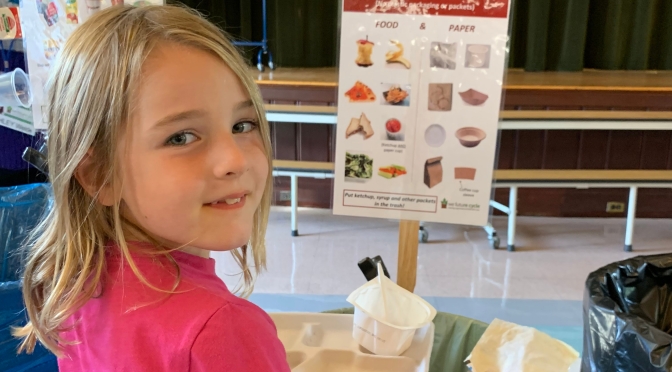One of the questions we frequently get asked is “How will Kindergarteners be able to compost in the lunchroom? Will they really be able to sort their lunch leftovers?”
Our resounding answer is alway “YES!,” and Daniel Warren Elementary School students proved that during their launch of the We Future Cycle program in October 2019.
Following the launch at F.E. Bellows in Rye Neck, which is a grade 3-5 school, We Future Cycle took on teaching the K-2 students at Daniel Warren about composting. Principal Tara Goldberg was very engaged in the launch. She is present during the entire 1 hr lunch period (1/2 hour for grade 2, 1/2hr for Kindergarten, and 1st grade is split up between the 2 lunch periods), which enabled her to optimize the flow of students as they came up to the 2 recycling & composting stations to sort their leftovers. We tried 3 set-ups before we arrived at a system which got the students through the lines most quickly! That is the right way to implement any innovative program like composting; launch with the best plan you have, but be flexible and optimize as time goes on.
The custodial team, led by Tom Tempesta, was enthusiastic about giving input to make the process seamless for them. The aides all jumped in to help; they immediately saw the benefit of recycling and composting and were eager to help the students sort their leftovers properly. Teachers take turns helping kids in the lunchroom – a practice which was common decades ago but is now uncommon in Westchester schools – which is a great way for educators to observe their students in a social environment and also help extend environmental education into their classrooms.
And, the parents, wow! We had parent volunteers from the start, and their dedication was impressive. We Future Cycle monitors the lunchroom stations for 2 weeks during the launch period, but then we leave the program in the hands of a champion at the school. The parents created their own monitoring schedule so they could continue to support the program when We Future Cycle moves on to launch other schools. And while we rely on administrators, aides, and custodians to keep the program operating on a daily basis, We Future Cycle checks in at each school twice per month to make sure everything is humming along smoothly.
The results at Daniel Warren were almost identical to the results at F.E. Bellow. 92% of the lunchroom waste was diverted into composting and recycling:
Liquid: 6lbs (10% of total weight)
Commingled (hard plastics and aluminum for recycling): 10lbs (16%)
Compost (food and paper): 34lbs (56%)
Trays (also will be composted): 6lbs (10%)
Trash: 5lbs (8%)
Total weight: 61lbs
Our only challenge is the many non-recyclable and ever-changing food service items. The Daniel Warren lunchroom has a cooler of water (which is preferable to single-use water bottles), but at one point there were 3 different cups next to the water cooler – one was a plastic recyclable cup, one was a paper compostable cup, and a third was a paper/plastic blend cup which would go in the trash! It is unnecessarily complicated when lunchrooms have an excessive number of single use items that must be sorted at the composting and recycling station, and we try to work with food service to make the packaging more simple.
Thank you to the Rye Neck PTSA for bringing this program to the Rye Neck elementary schools and for their financial and volunteer commitment to this initiative. We look forward to bringing the program to the MS/HS in the near future!



